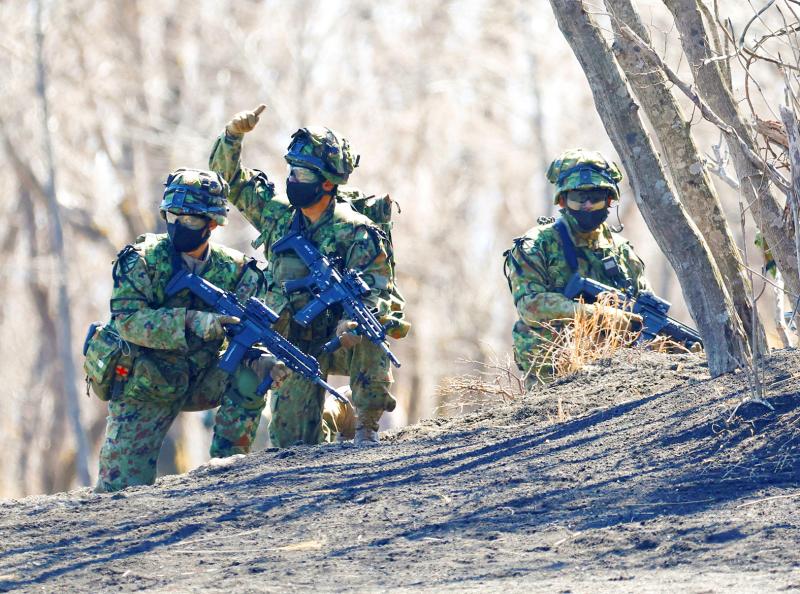In a sign of deepening military cooperation between Japan and the US, amphibious Japanese troops and US Marines yesterday practiced airborne landing assaults together for the first time.
Japan is revising a decade-old national security strategy this year in the face of China’s growing military assertiveness. The upgrade to defense policy guidelines is expected to call for the nation to take a more active role alongside Washington in regional security.
The drills in the foothills of Mount Fuji yesterday involved 400 troops from Japan’s Amphibious Rapid Deployment Brigade (ARDB) and 600 US Marines, and is part of a three-week joint exercise to hone interoperability between the allies.

Photo: Reuters
Tilt-rotor Osprey troop carriers were used during the drills.
“The real significance from this training is that the [US] Marines and the ARDB are doing serious combat training of a sort that would have been unthinkable a decade ago,” said Grant Newsham, a retired US Marine Corps colonel who advised Japan as a liaison officer when it set up its amphibious force.
“It demonstrates a more solidly linked US and Japan,” he said.
Activated in 2018, the ARDB troops are Japan’s first marines since World War II and were formed to reinforce its defense along its southwest islands at the edge of the East China Sea.
Trained to take back captured islands using helicopters, Ospreys and amphibious landing craft, the force of about 1,500 troops would likely be one of the first in action to counter any Chinese attack on Japan’s islands.
Beijing, which is locked in a territorial dispute with Japan over uninhabited islands that are controlled by Tokyo in the East China Sea, routinely dispatches ships to assert its claims.
The joint drills also come as Russia’s invasion of Ukraine raises fresh security concerns in East Asia, where China is putting pressure on Taiwan following its crackdown on Hong Kong.
Japan also faces Russia’s forces operating from Asian bases that are increasingly cooperating with the Chinese military.

Kehinde Sanni spends his days smoothing out dents and repainting scratched bumpers in a modest autobody shop in Lagos. He has never left Nigeria, yet he speaks glowingly of Burkina Faso military leader Ibrahim Traore. “Nigeria needs someone like Ibrahim Traore of Burkina Faso. He is doing well for his country,” Sanni said. His admiration is shaped by a steady stream of viral videos, memes and social media posts — many misleading or outright false — portraying Traore as a fearless reformer who defied Western powers and reclaimed his country’s dignity. The Burkinabe strongman swept into power following a coup in September 2022

‘FRAGMENTING’: British politics have for a long time been dominated by the Labor Party and the Tories, but polls suggest that Reform now poses a significant challenge Hard-right upstarts Reform UK snatched a parliamentary seat from British Prime Minister Keir Starmer’s Labor Party yesterday in local elections that dealt a blow to the UK’s two establishment parties. Reform, led by anti-immigrant firebrand Nigel Farage, won the by-election in Runcorn and Helsby in northwest England by just six votes, as it picked up gains in other localities, including one mayoralty. The group’s strong showing continues momentum it built up at last year’s general election and appears to confirm a trend that the UK is entering an era of multi-party politics. “For the movement, for the party it’s a very, very big

ENTERTAINMENT: Rio officials have a history of organizing massive concerts on Copacabana Beach, with Madonna’s show drawing about 1.6 million fans last year Lady Gaga on Saturday night gave a free concert in front of 2 million fans who poured onto Copacabana Beach in Rio de Janeiro for the biggest show of her career. “Tonight, we’re making history... Thank you for making history with me,” Lady Gaga told a screaming crowd. The Mother Monster, as she is known, started the show at about 10:10pm local time with her 2011 song Bloody Mary. Cries of joy rose from the tightly packed fans who sang and danced shoulder-to-shoulder on the vast stretch of sand. Concert organizers said 2.1 million people attended the show. Lady Gaga

SUPPORT: The Australian prime minister promised to back Kyiv against Russia’s invasion, saying: ‘That’s my government’s position. It was yesterday. It still is’ Left-leaning Australian Prime Minister Anthony Albanese yesterday basked in his landslide election win, promising a “disciplined, orderly” government to confront cost-of-living pain and tariff turmoil. People clapped as the 62-year-old and his fiancee, Jodie Haydon, who visited his old inner Sydney haunt, Cafe Italia, surrounded by a crowd of jostling photographers and journalists. Albanese’s Labor Party is on course to win at least 83 seats in the 150-member parliament, partial results showed. Opposition leader Peter Dutton’s conservative Liberal-National coalition had just 38 seats, and other parties 12. Another 17 seats were still in doubt. “We will be a disciplined, orderly